Verdict
The Razer Leviathan V2 Pro is an impressive soundbar and subwoofer combo, designed specifically for gamers who want 3D audio effects without the need for added speakers – although most will find better value using a headset instead.
Pros
- Immersive 3D audio
- Booming bass
- Intuative physical controls
- RGB lighting syncs with Razer peripherals
Cons
- 3D audio can sound overwhelmed in busy scenes
- Lack of tweeters limits high frequency
- Can only really be used at a desktop
Introduction
Surround sound systems are championed for providing a cinema-like audio experience in your living room. Unfortunately, it’s more difficult to have a surround sound setup for your desktop gaming PC.
The Razer Leviathan V2 Pro soundbar and subwoofer package aim to solve this problem, using clever beamforming and head-tracking technology to recreate the effect of surround sound without needing additional speakers to do so. This provides room-filling 3D audio for supported PC games, increasing the immersion tenfold.
Does this sound too good to be true? I’ve spent a few weeks with the Razer Leviathan V2 Pro to test it out for myself, and you can read my impressions and verdict below.
Design
- Both soundbar and subwoofer included
- Need to sit close to camera for 3D effect
- RGB lighting looks great
The Razer Leviathan V2 Pro comes in two parts: a soundbar that sits in front of your monitor or TV, and a subwoofer designed to sit on the floor underneath your desk.
The soundbar is a little too large for my liking, stretching out to 600mm which is roughly the same width as my 32-inch gaming monitor. It’s also tall at 113.7mm, although fortunately wasn’t so large that it blocked off of my monitor’s screen.
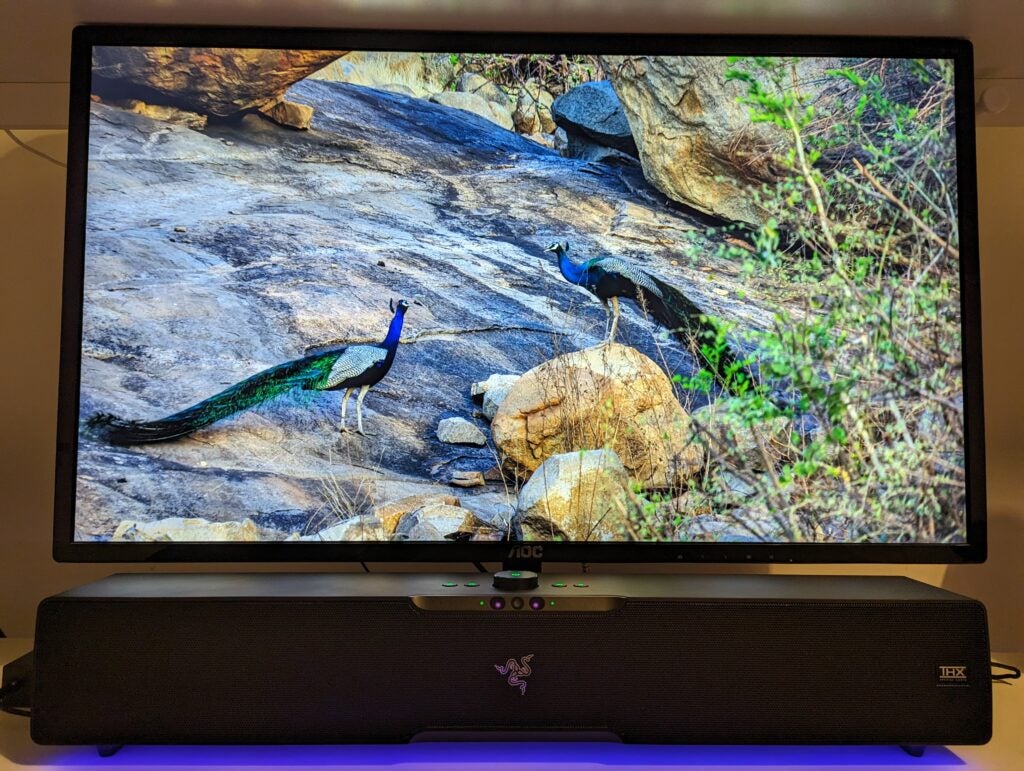
Still, it’s a large soundbar that may be difficult to accommodate, especially if you already find yourself running out of desk space. Equally, I do appreciate that it would be difficult for Razer to make it smaller since it houses 5x 2-inch full-range drivers, as well as the front-facing camera to make the beamforming tricks possible.
Despite its large size, the Razer Leviathan V2 Pro is a nice looking device. A speaker grille runs edge to edge on the front, with a Razer logo slapped bang in the middle.
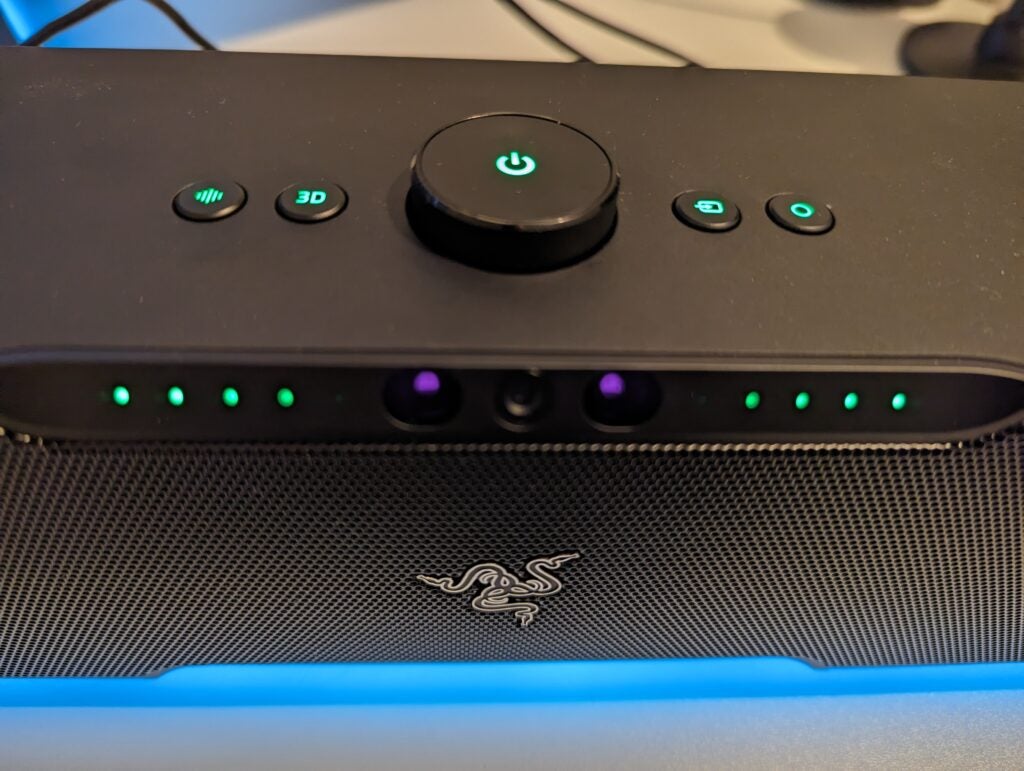
On the top you’ll find easy-to-reach buttons that can be used to select an equaliser, audio mode, source and Chroma lighting. There’s also a big volume dial in the centre, which also doubles up as the power button when pushed down. I really appreciated having these physical buttons on the speaker rather than having to use software to tweak everything, although I would appreciate a bundled remote too given the price.
At the bottom of the soundbar you’ll find a row of RGB lights that shine down on your desk, bright enough that the colours are visible even in well lit rooms. Best of all, the colour of the lighting can sync up with other Razer peripherals, cycling through colours in unison with my Razer keyboard and mouse for a satisfying glow-up effect.
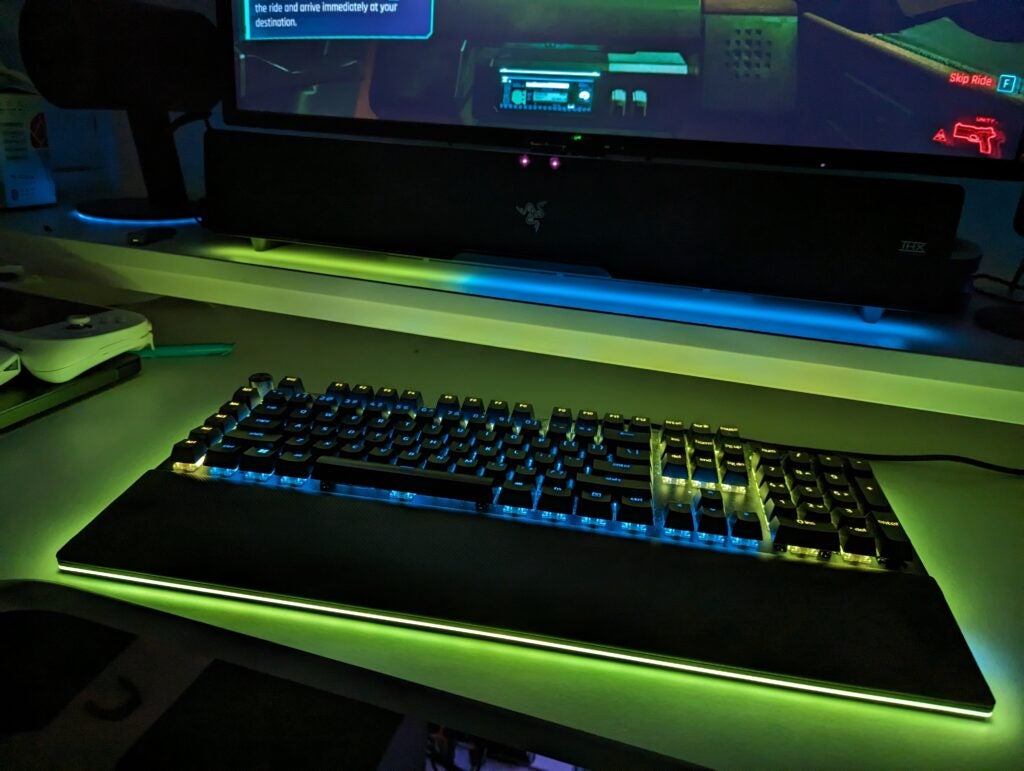
Around the back of the Razer Leviathan V2 Pro soundbar you’ll find port connections for power, the subwoofer, 3.5mm for headsets and USB-C for PC – the latter of which connects to your PC via a USB-A connection.
Connecting to your PC via USB may be problematic for those already running out of free ports, and the lack of HDMI and optical inputs also rules out a direct connection to a smart TV.
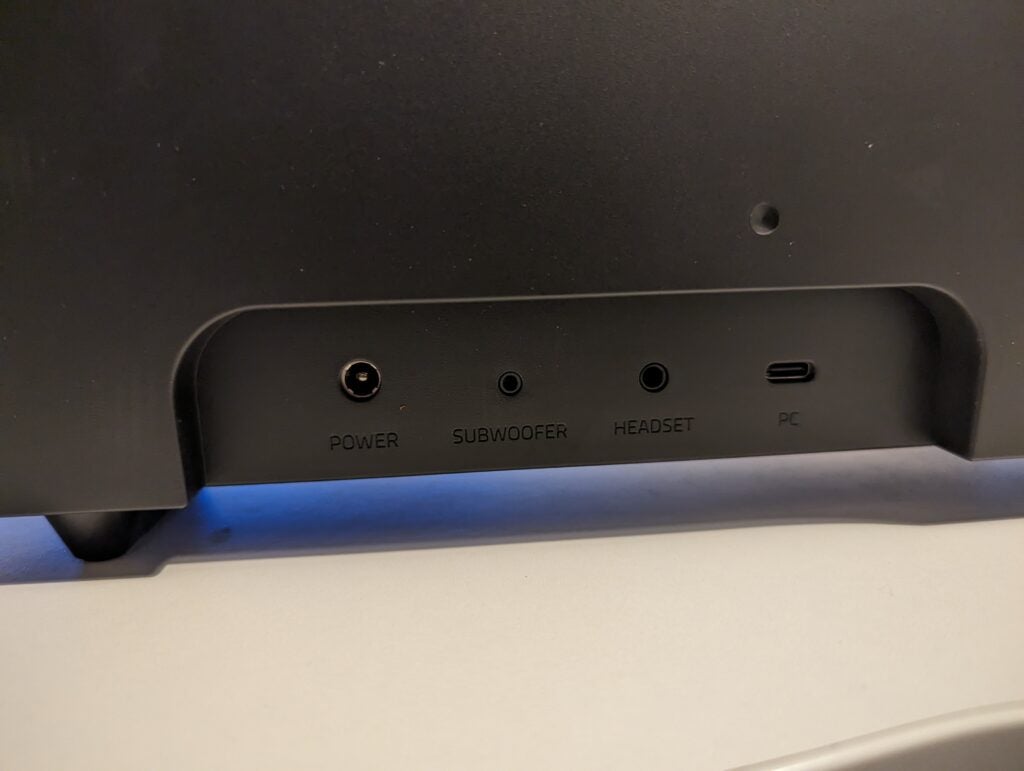
The Razer Leviathan V2 Pro can also connect via Bluetooth, allowing me to play Spotify tunes through my smartphone. What’s more, you’re able to switch between the Bluetooth and wired mode instantly via a button on the top. I personally didn’t find myself switching to the Bluetooth mode all that often, but it’s still a welcome added feature.
The subwoofer is also a beast when it comes to size, with a length of 260mm, height of 295mm and depth of 260mm. Since it’s designed to sit on the floor, you don’t need to worry about it taking up valuable desk space, but I still found it difficult to adjust to as it took up space where I’d usually rest my legs.
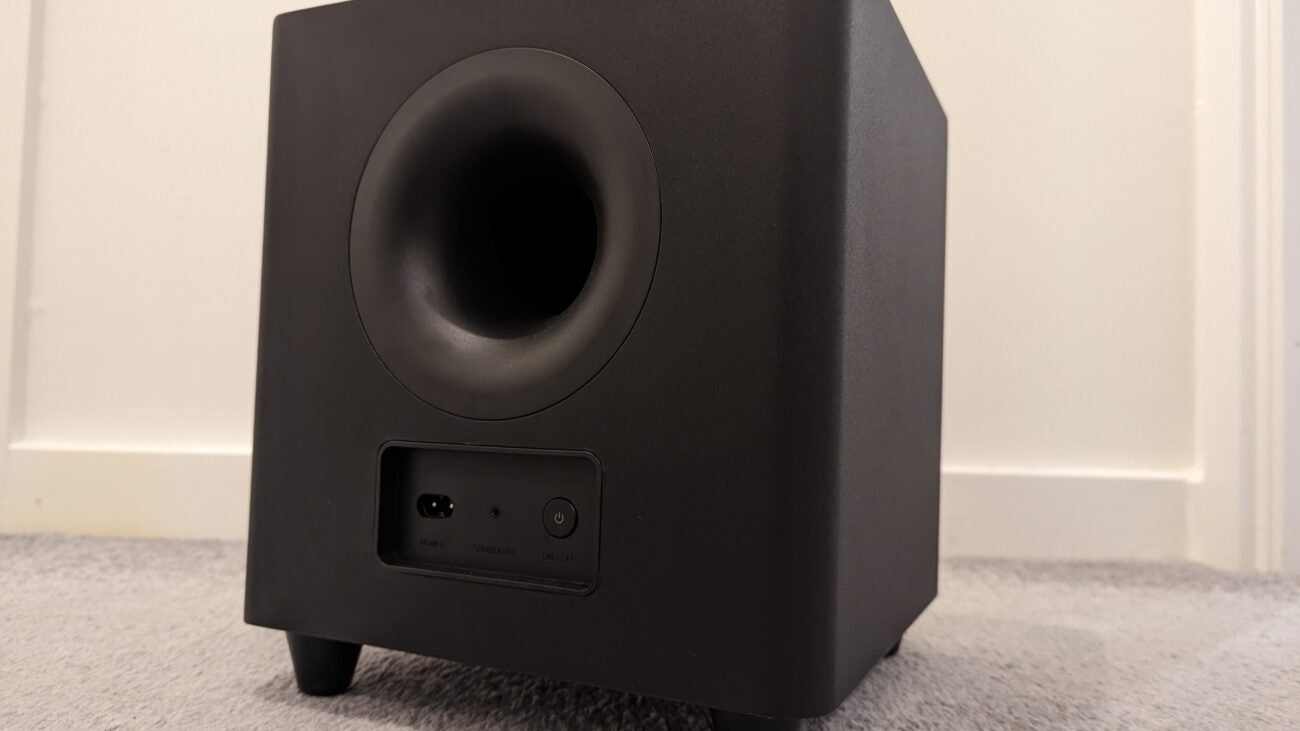
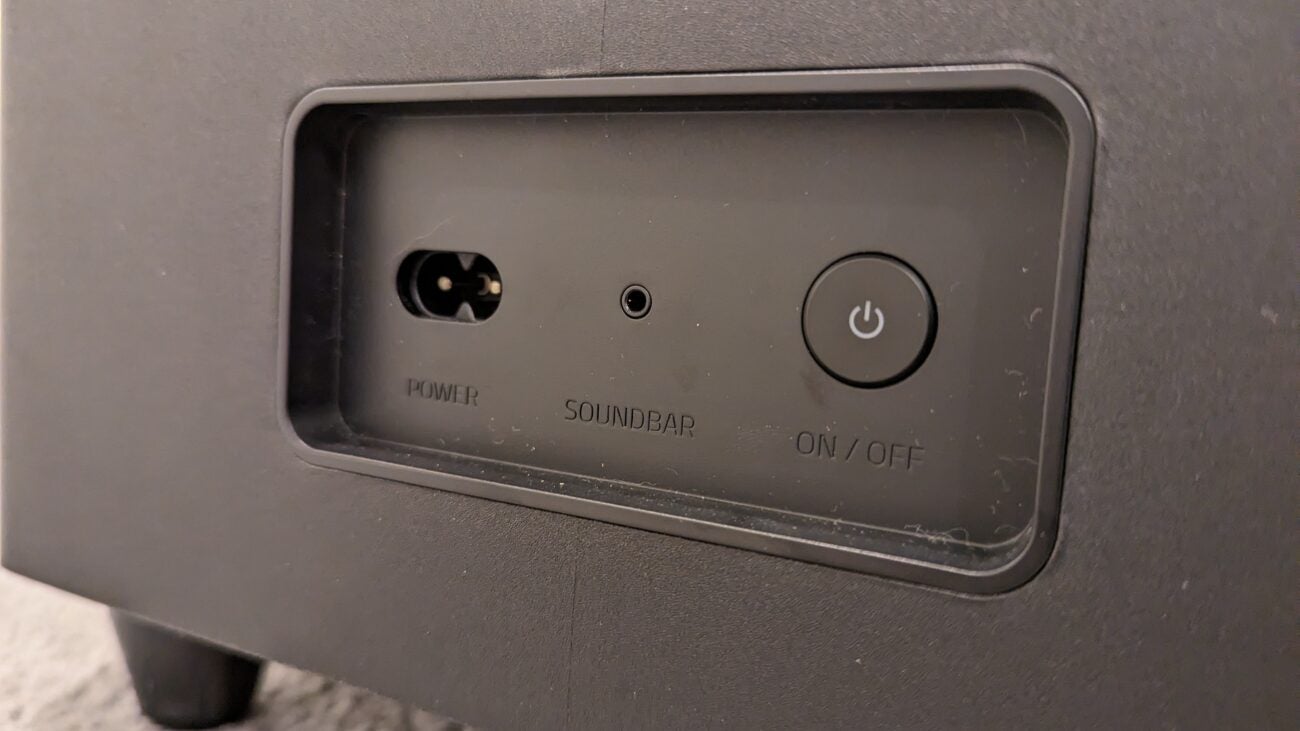
Razer Leviathan V2 Pro subwoofer
Razer Leviathan V2 Pro subwoofer ports
The subwoofer looks like a big black box, with far less stylish design elements than the soundbar. On the rear there’s a power port, as well as a connection to link up with the soundbar. All of the required cables are included in the box.
Features
- Immersive 3D audio sounds fantastic
- Can struggle with busy scenes
- Capable of stereo playback for music
The Razer Leviathan V2 Pro soundbar has a unique talent of being able to produce 3D sound without the need for additional speakers dotted around the room. It sounds too good to be true, but it really does work.
This is possible thanks to two elements: Razer’s head-tracking camera nestled in the front of the soundbar and the AI-powered beamforming technology supplied by start-up company Audioscenic.
Razer recommends that you sit between 0.3 and 1.5 metres away from this camera for an optimal experience. This rules out using the soundbar with a TV in a living room, so is only really worthwhile in tandem with a desktop PC. With my own desktop setup, the camera only ever struggled to detect my head in a dark room. In such events, the green lighting on the front of the soundbar alerted me to the problem.
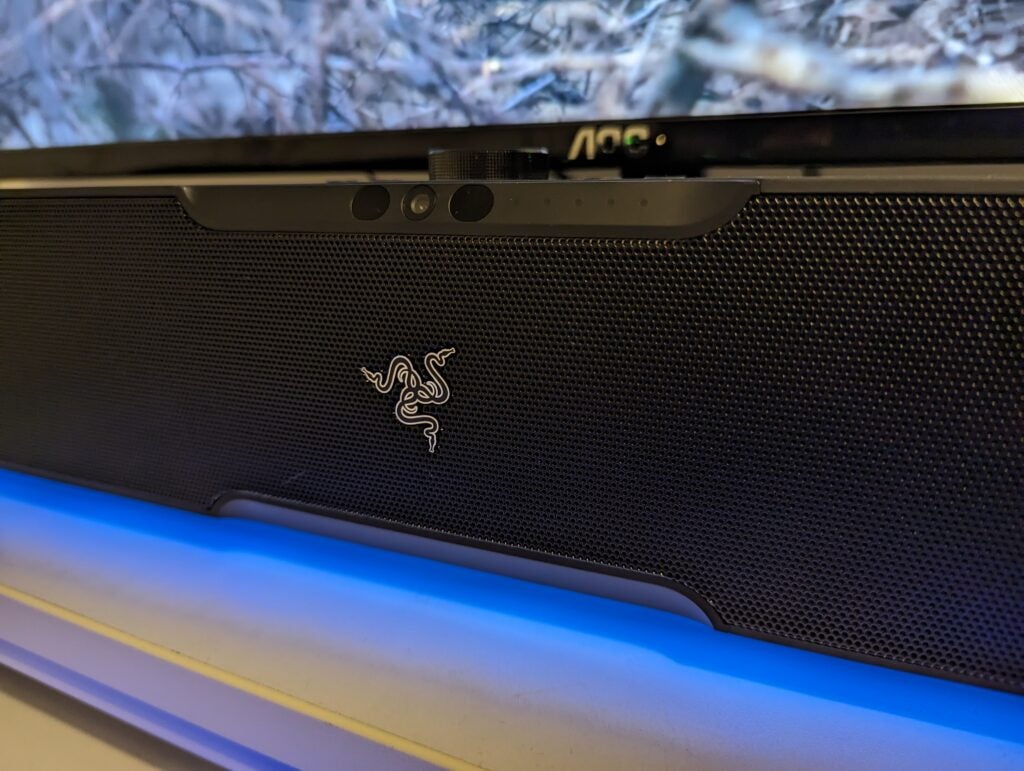
When your head’s in view of the camera, the beamforming technology will track its position and then send beams of sound to your left and right ears to replicate the effect of 3D audio. It’s surprisingly accurate and isn’t too far off the quality of my real Sonos surround system.
When playing an open-world game such as Cyberpunk 2077, I can hear the various city sounds coming from multiple directions, be it the siren of a police car, chatter of passer-bys or the roaring gunshots right ahead of me.
This isn’t just great for improving the immersion of these virtual worlds, but it also has a practical use case. When playing multiplayer shooters, I could detect the location of rival players via sound alone. It’s not quite as accurate or defined as wearing a good quality headset, but it feels a lot more liberating to benefit from 3D audio without anything clogging up my ears.
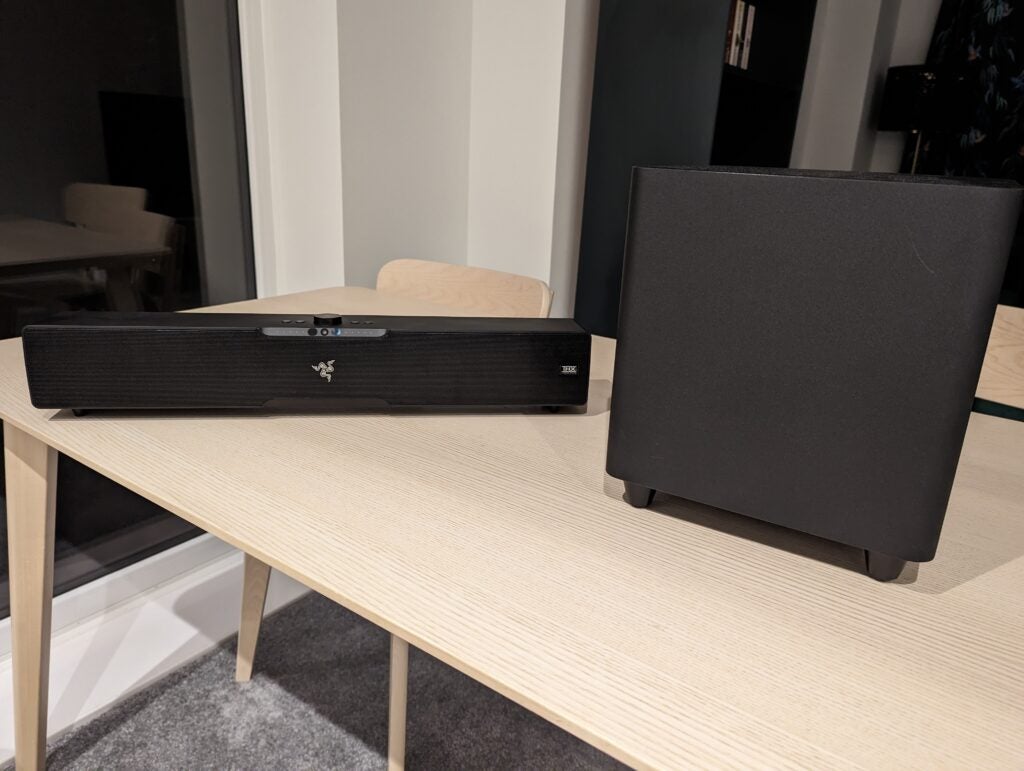
The Razer Leviathan V2 Pro worked great for Horizon Zero Dawn for the most part but it was in this game where I started to recognise the limitations of the 3D technology.
The Leviathan V2 Pro struggled when tasked with producing a large variety of sounds simultaneously. During a few combat encounters, with the chaotic melody of monster roars, thundering metallic footsteps and the zapping laser beams, the soundbar’s audio turned harsh and unpleasant. That’s to be expected, as a single soundbar is never going to be capable of producing so many different sounds effectively compared to a setup with multiple speakers.
Due to the nature of the beamforming technology, it’s not possible for more than one person to benefit from the 3D audio effect simultaneously. This once again hammers across the point that the Razer Leviathan V2 Pro is designed specifically for desktop gaming, and is not a good choice for the living room.
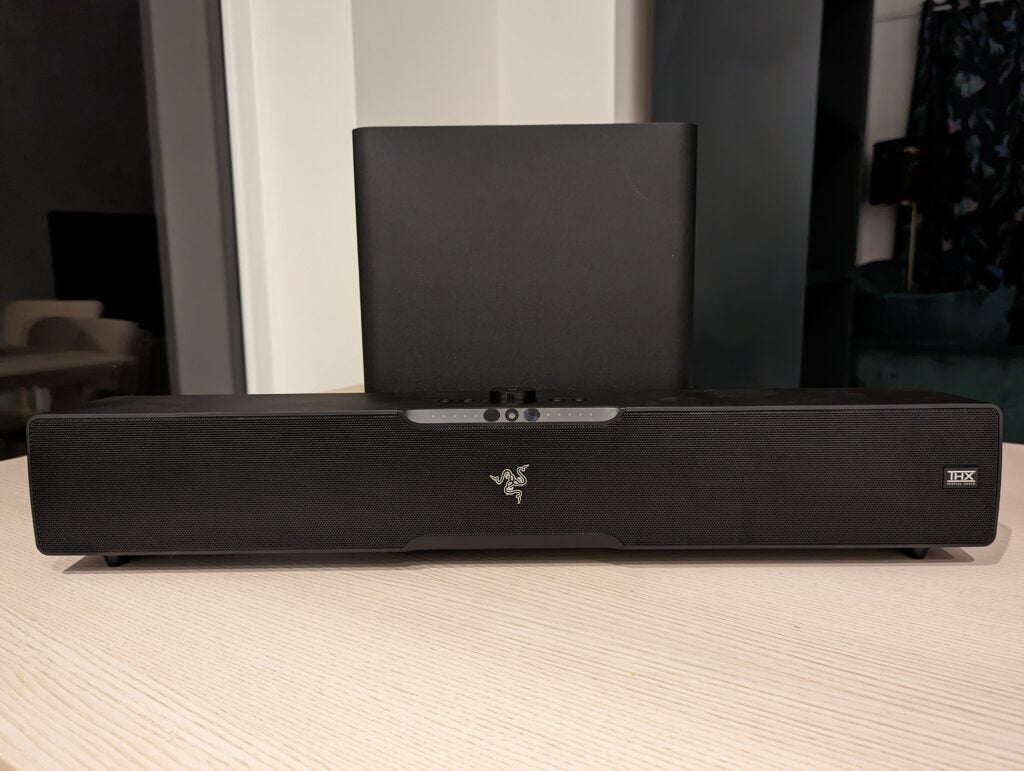
That said, Razer does smartly offer up multiple audio modes, one of which turns off the 3D effects and makes the Leviathan V2 Pro more like a traditional soundbar with room-filling audio. The other audio modes include stereo (best for music), virtual headset (for binaural audio sources) and virtual speakers (multi-channel audio sources).
The 3D button on the top of the speaker allows you to flick between these different audio modes instantly, making it very easy to find the best profile for each source.
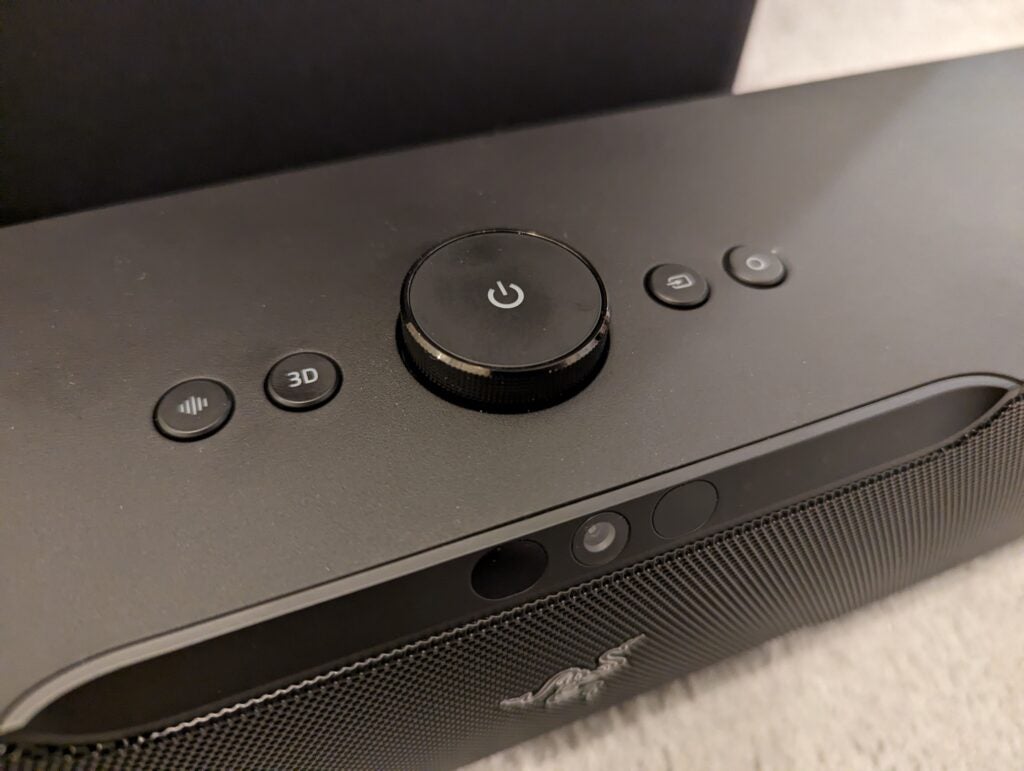
This helps the Leviathan V2 Pro shine for content outside of gaming. I watched Spider-Man: Homecoming with the speaker, and found the 3D effect to give Vulture’s rocket thrusters more depth, and the action sequences more cinematic. Any film that supports 5.1 surround sound should see a 3D enhancement, and there’s plenty of this ilk on Netflix and Disney Plus.
The 3D audio wasn’t quite so useful for music playback via the likes of Spotify, with the 3D effect generally limited to a stereo format. That said, it was still nice to experience the bi-lateral effects of Queen’s Bohemian Rhapsody without donning a pair of headphones.
Sound quality
- Sounds great for gaming
- Booming bass can be distracting
- Limited high frequency
The 3D audio is undoubtedly the main reason why you’d consider buying the Razer Leviathan V2 Pro, but the audio quality is still an important consideration. I was impressed with the performance here, although the bass can be accused of being overimposing.
The Leviathan V2 Pro performs best in gaming. There’s plenty enough detail for more subtle sounds such as the crackling of a campfire and rustling of tall grass in Horizon Zero Dawn. But most impressive of all was the thwack of the bass, with the booming footsteps of a Tallneck robot causing my room to shudder.
The roaring judder of a machine gun and thunderous blast of a grenade both sound excellent when playing CyberPunk 2077, while dialogue is wonderfully detailed so I never had to resort to reading the subtitles.
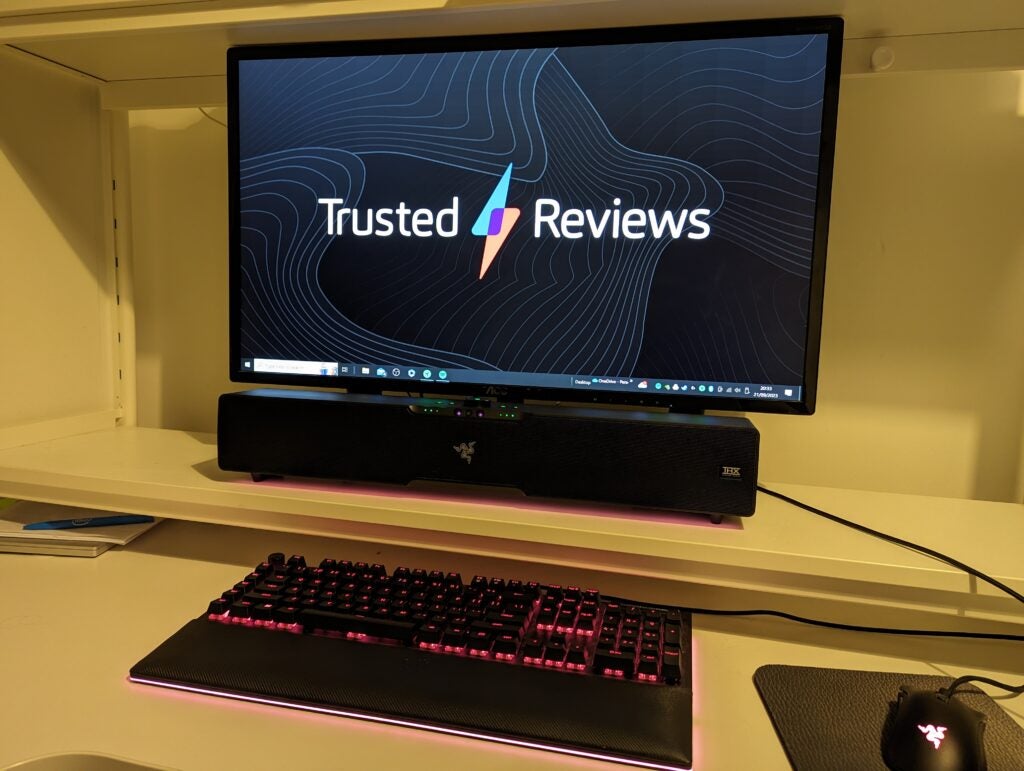
However, when listening to a variety of songs on Spotify, it soon became apparent that there was an imbalance, with the bass often dominating the forefront. When playing Passion Pit’s Take a Walk, the bass was so strong that it felt as if the track was hammering against my wall, detracting from the vocals and instrumentals. I was able to tweak the intensity of the bass via Razer’s software on my PC, but the bass remained distracting even when turned down to 0 in the equaliser.
The Razer Leviathan V2 Pro also performs poorly when it comes to high frequencies. The high notes of Olivia Rodrigo’s Vampire sound thin and subdued, with the piano notes taking a backseat to the beat of the drum. The speaker fails to deliver a balanced performance, with the same track sounding far more dynamic on my Sonos Beam soundbar.
There’s a good explanation for this too, as the spec sheet suggests there are no tweeters inside the Razer Leviathan V2 Pro, despite featuring in the non-Pro variants. It seems that Razer has been forced to sacrifice the tweeter drivers to make space for that beamforming technology.
Latest deals
Should you buy it?
You want surround sound for PC gaming
The Razer Leviathan V2 Pro is unique in delivering room-filling 3D audio without the need for additional speakers or headphones. Factor in the booming bass, and it delivers a superb immersive experience for PC gamers.
You are happy to wear a gaming headset
A gaming headset is a far more affordable option for those who want that 3D audio effect. And you can also find a far more balanced performance by checking out the top-ranking options in our Best Gaming Headset guide.
Final Thoughts
The Razer Leviathan V2 Pro nails its key goal of delivering immersive 3D audio for PC gaming without the need for external speakers. This makes it a practical and affordable solution for a desktop PC setup, even if it does have numerous limitations compared to a physical surround sound system.
Sound quality is good, but the bass can be overwhelming and the lack of tweeters causes the soundbar to struggle with high notes. With so many compromises to be made, it’s tempting to use a headset instead or forgo the 3D effects completely and get the Razer Leviathan V2 at a significantly more affordable price.
Nevertheless, if you fit the niche of craving 3D audio for PC gaming, but don’t fancy wearing headphones, then the Razer Leviathan V2 Pro is a superb solution.
How we test
We test every soundbar we review thoroughly over an extended period of time. We use industry-standard tests to compare features properly. We’ll always tell you what we find. We never, ever, accept money to review a product.
Find out more about how we test in our ethics policy.
FAQs
It really just depends how much use you’ll get out of the 3D effects, and wouldn’t rather use a gaming headset instead. If you just want a gaming-centric soundbar without 3D audio, then the Razer Leviathan V2 is a more affordable and better balanced pick.
You can’t plug the Razer Leviathan V2 Pro directly into a TV, and it uses a USB-C connection to connect to a PC instead.
Verdict
The Razer Leviathan V2 Pro is an impressive soundbar and subwoofer combo, designed specifically for gamers who want 3D audio effects without the need for added speakers – although most will find better value using a headset instead.
Pros
- Immersive 3D audio
- Booming bass
- Intuative physical controls
- RGB lighting syncs with Razer peripherals
Cons
- 3D audio can sound overwhelmed in busy scenes
- Lack of tweeters limits high frequency
- Can only really be used at a desktop
Introduction
Surround sound systems are championed for providing a cinema-like audio experience in your living room. Unfortunately, it’s more difficult to have a surround sound setup for your desktop gaming PC.
The Razer Leviathan V2 Pro soundbar and subwoofer package aim to solve this problem, using clever beamforming and head-tracking technology to recreate the effect of surround sound without needing additional speakers to do so. This provides room-filling 3D audio for supported PC games, increasing the immersion tenfold.
Does this sound too good to be true? I’ve spent a few weeks with the Razer Leviathan V2 Pro to test it out for myself, and you can read my impressions and verdict below.
Design
- Both soundbar and subwoofer included
- Need to sit close to camera for 3D effect
- RGB lighting looks great
The Razer Leviathan V2 Pro comes in two parts: a soundbar that sits in front of your monitor or TV, and a subwoofer designed to sit on the floor underneath your desk.
The soundbar is a little too large for my liking, stretching out to 600mm which is roughly the same width as my 32-inch gaming monitor. It’s also tall at 113.7mm, although fortunately wasn’t so large that it blocked off of my monitor’s screen.

Still, it’s a large soundbar that may be difficult to accommodate, especially if you already find yourself running out of desk space. Equally, I do appreciate that it would be difficult for Razer to make it smaller since it houses 5x 2-inch full-range drivers, as well as the front-facing camera to make the beamforming tricks possible.
Despite its large size, the Razer Leviathan V2 Pro is a nice looking device. A speaker grille runs edge to edge on the front, with a Razer logo slapped bang in the middle.

On the top you’ll find easy-to-reach buttons that can be used to select an equaliser, audio mode, source and Chroma lighting. There’s also a big volume dial in the centre, which also doubles up as the power button when pushed down. I really appreciated having these physical buttons on the speaker rather than having to use software to tweak everything, although I would appreciate a bundled remote too given the price.
At the bottom of the soundbar you’ll find a row of RGB lights that shine down on your desk, bright enough that the colours are visible even in well lit rooms. Best of all, the colour of the lighting can sync up with other Razer peripherals, cycling through colours in unison with my Razer keyboard and mouse for a satisfying glow-up effect.

Around the back of the Razer Leviathan V2 Pro soundbar you’ll find port connections for power, the subwoofer, 3.5mm for headsets and USB-C for PC – the latter of which connects to your PC via a USB-A connection.
Connecting to your PC via USB may be problematic for those already running out of free ports, and the lack of HDMI and optical inputs also rules out a direct connection to a smart TV.

The Razer Leviathan V2 Pro can also connect via Bluetooth, allowing me to play Spotify tunes through my smartphone. What’s more, you’re able to switch between the Bluetooth and wired mode instantly via a button on the top. I personally didn’t find myself switching to the Bluetooth mode all that often, but it’s still a welcome added feature.
The subwoofer is also a beast when it comes to size, with a length of 260mm, height of 295mm and depth of 260mm. Since it’s designed to sit on the floor, you don’t need to worry about it taking up valuable desk space, but I still found it difficult to adjust to as it took up space where I’d usually rest my legs.


Razer Leviathan V2 Pro subwoofer
Razer Leviathan V2 Pro subwoofer ports
The subwoofer looks like a big black box, with far less stylish design elements than the soundbar. On the rear there’s a power port, as well as a connection to link up with the soundbar. All of the required cables are included in the box.
Features
- Immersive 3D audio sounds fantastic
- Can struggle with busy scenes
- Capable of stereo playback for music
The Razer Leviathan V2 Pro soundbar has a unique talent of being able to produce 3D sound without the need for additional speakers dotted around the room. It sounds too good to be true, but it really does work.
This is possible thanks to two elements: Razer’s head-tracking camera nestled in the front of the soundbar and the AI-powered beamforming technology supplied by start-up company Audioscenic.
Razer recommends that you sit between 0.3 and 1.5 metres away from this camera for an optimal experience. This rules out using the soundbar with a TV in a living room, so is only really worthwhile in tandem with a desktop PC. With my own desktop setup, the camera only ever struggled to detect my head in a dark room. In such events, the green lighting on the front of the soundbar alerted me to the problem.

When your head’s in view of the camera, the beamforming technology will track its position and then send beams of sound to your left and right ears to replicate the effect of 3D audio. It’s surprisingly accurate and isn’t too far off the quality of my real Sonos surround system.
When playing an open-world game such as Cyberpunk 2077, I can hear the various city sounds coming from multiple directions, be it the siren of a police car, chatter of passer-bys or the roaring gunshots right ahead of me.
This isn’t just great for improving the immersion of these virtual worlds, but it also has a practical use case. When playing multiplayer shooters, I could detect the location of rival players via sound alone. It’s not quite as accurate or defined as wearing a good quality headset, but it feels a lot more liberating to benefit from 3D audio without anything clogging up my ears.

The Razer Leviathan V2 Pro worked great for Horizon Zero Dawn for the most part but it was in this game where I started to recognise the limitations of the 3D technology.
The Leviathan V2 Pro struggled when tasked with producing a large variety of sounds simultaneously. During a few combat encounters, with the chaotic melody of monster roars, thundering metallic footsteps and the zapping laser beams, the soundbar’s audio turned harsh and unpleasant. That’s to be expected, as a single soundbar is never going to be capable of producing so many different sounds effectively compared to a setup with multiple speakers.
Due to the nature of the beamforming technology, it’s not possible for more than one person to benefit from the 3D audio effect simultaneously. This once again hammers across the point that the Razer Leviathan V2 Pro is designed specifically for desktop gaming, and is not a good choice for the living room.

That said, Razer does smartly offer up multiple audio modes, one of which turns off the 3D effects and makes the Leviathan V2 Pro more like a traditional soundbar with room-filling audio. The other audio modes include stereo (best for music), virtual headset (for binaural audio sources) and virtual speakers (multi-channel audio sources).
The 3D button on the top of the speaker allows you to flick between these different audio modes instantly, making it very easy to find the best profile for each source.

This helps the Leviathan V2 Pro shine for content outside of gaming. I watched Spider-Man: Homecoming with the speaker, and found the 3D effect to give Vulture’s rocket thrusters more depth, and the action sequences more cinematic. Any film that supports 5.1 surround sound should see a 3D enhancement, and there’s plenty of this ilk on Netflix and Disney Plus.
The 3D audio wasn’t quite so useful for music playback via the likes of Spotify, with the 3D effect generally limited to a stereo format. That said, it was still nice to experience the bi-lateral effects of Queen’s Bohemian Rhapsody without donning a pair of headphones.
Sound quality
- Sounds great for gaming
- Booming bass can be distracting
- Limited high frequency
The 3D audio is undoubtedly the main reason why you’d consider buying the Razer Leviathan V2 Pro, but the audio quality is still an important consideration. I was impressed with the performance here, although the bass can be accused of being overimposing.
The Leviathan V2 Pro performs best in gaming. There’s plenty enough detail for more subtle sounds such as the crackling of a campfire and rustling of tall grass in Horizon Zero Dawn. But most impressive of all was the thwack of the bass, with the booming footsteps of a Tallneck robot causing my room to shudder.
The roaring judder of a machine gun and thunderous blast of a grenade both sound excellent when playing CyberPunk 2077, while dialogue is wonderfully detailed so I never had to resort to reading the subtitles.

However, when listening to a variety of songs on Spotify, it soon became apparent that there was an imbalance, with the bass often dominating the forefront. When playing Passion Pit’s Take a Walk, the bass was so strong that it felt as if the track was hammering against my wall, detracting from the vocals and instrumentals. I was able to tweak the intensity of the bass via Razer’s software on my PC, but the bass remained distracting even when turned down to 0 in the equaliser.
The Razer Leviathan V2 Pro also performs poorly when it comes to high frequencies. The high notes of Olivia Rodrigo’s Vampire sound thin and subdued, with the piano notes taking a backseat to the beat of the drum. The speaker fails to deliver a balanced performance, with the same track sounding far more dynamic on my Sonos Beam soundbar.
There’s a good explanation for this too, as the spec sheet suggests there are no tweeters inside the Razer Leviathan V2 Pro, despite featuring in the non-Pro variants. It seems that Razer has been forced to sacrifice the tweeter drivers to make space for that beamforming technology.
Latest deals
Should you buy it?
You want surround sound for PC gaming
The Razer Leviathan V2 Pro is unique in delivering room-filling 3D audio without the need for additional speakers or headphones. Factor in the booming bass, and it delivers a superb immersive experience for PC gamers.
You are happy to wear a gaming headset
A gaming headset is a far more affordable option for those who want that 3D audio effect. And you can also find a far more balanced performance by checking out the top-ranking options in our Best Gaming Headset guide.
Final Thoughts
The Razer Leviathan V2 Pro nails its key goal of delivering immersive 3D audio for PC gaming without the need for external speakers. This makes it a practical and affordable solution for a desktop PC setup, even if it does have numerous limitations compared to a physical surround sound system.
Sound quality is good, but the bass can be overwhelming and the lack of tweeters causes the soundbar to struggle with high notes. With so many compromises to be made, it’s tempting to use a headset instead or forgo the 3D effects completely and get the Razer Leviathan V2 at a significantly more affordable price.
Nevertheless, if you fit the niche of craving 3D audio for PC gaming, but don’t fancy wearing headphones, then the Razer Leviathan V2 Pro is a superb solution.
How we test
We test every soundbar we review thoroughly over an extended period of time. We use industry-standard tests to compare features properly. We’ll always tell you what we find. We never, ever, accept money to review a product.
Find out more about how we test in our ethics policy.
FAQs
It really just depends how much use you’ll get out of the 3D effects, and wouldn’t rather use a gaming headset instead. If you just want a gaming-centric soundbar without 3D audio, then the Razer Leviathan V2 is a more affordable and better balanced pick.
You can’t plug the Razer Leviathan V2 Pro directly into a TV, and it uses a USB-C connection to connect to a PC instead.

























